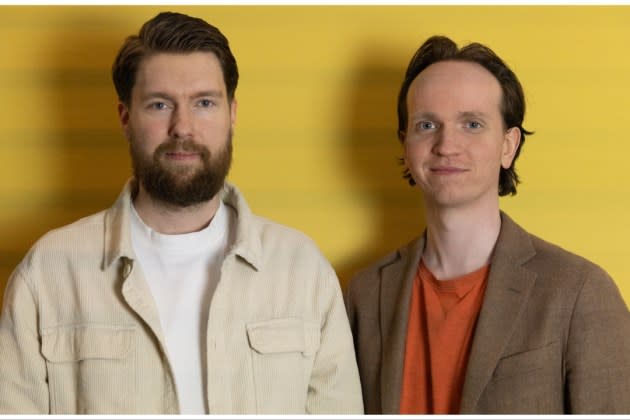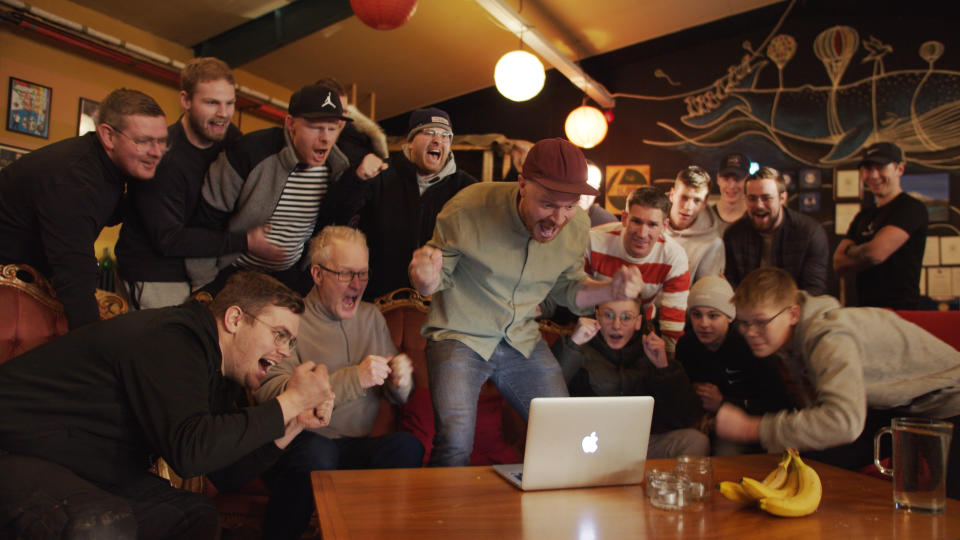Directors Of Glasgow Film Fest Winner ‘The Home Game’ Discuss Crafting A Feel-Good Doc About Icelandic Soccer Underdogs

When Icelandic directors Smari Gunn and Logi Sigursveinsson set out to make The Home Game, they couldn’t have imagined the response this small, local Icelandic documentary would gather on the festival circuit. The film, which follows a group of spirited underdogs as they fight for local soccer glory, is coming off the back of a rapturous reception at the Glasgow Film Festival, where it won the fest’s prestigious Audience Award. It previously screened at the Tromso International Film Festival, DOC NYC and Nordisk Panorama.
The Home Game follows the story of an impulsive Icelander, Kari Vidarsson, who wants to fulfil his father Vidar’s failed dream to get their small fishing village, Hellissandur (population 369), a home game on the unused football pitch he built. While Vidar managed to build a team in 1994, the side ultimately drew an away game and fell to a 10-0 defeat. Fast-forward to 2020 and his son Kari takes up the gauntlet, re-forming Reynir FC with a ragtag bunch of locals, including 15-year-old schoolboy rapper David Svanur Hafthorsson, 40-something big man in goal Gunnar Orm Arnarson, and former Iceland Women’s Team international Freydis Bjarnadottir, whose inclusion in the team threatens them with disqualification from the FA.
More from Deadline
Deadline sat down with directors Gunn and Sigursveinsson to talk about how they landed this charming, classic underdog tale, challenges they faced in making their first documentary feature and why, despite shooting during the pandemic, it was essential to keep Covid-19 out of the storyline.
DEADLINE: How did you guys find this story and what compelled you to pick away to see if there was something there in the feature documentary space?
SMARI GUNN: We both knew Kari personally beforehand, but Logi and I didn’t know each other. Kari actually told us individually about this football pitch that had been standing there for 25 years, and because of this traumatic loss back in the 90s, it had been standing there unused. He told us he was planning on surprising his father by getting the team back together and finish this mission as like a token or homage to his father and we just found it so heart-warming and hilarious that we started filming it without having any money or knowing what we were going to do with it.
We thought we wanted to make a feature film but we weren’t really sure whether we could so we actually found a proof of concept that we then used to pitch to a production company and then we got the Icelandic Film Fund to come aboard and it sort of snowballed from there.
DEADLINE: You started filming this during the pandemic, correct? How did you manage this?
GUNN: In the city, there were big outbreaks but in the rural areas, it was much better contained and we obviously had to be very careful when we were going to film so we had a very stripped back crew. But we wanted to make a film that didn’t remind people of a terrible time in their lives so we cut Covid completely out of the storyline.
DEADLINE: Kari is quite a character. It feels like that if he gets something into is head, there’s no stopping him.
GUNN: This is true. He is the mastermind behind this film without being involved in it creatively because he basically just said, “You guys just make a film and we’re going to do the football team and we will do what we are going to do.” To be fair, he didn’t want to see an edit or anything until the final film. And he was so emotional when he finally got to watch the film and couldn’t speak to us for a day because he just had this roller coaster journey through watching himself. Then he said he couldn’t be prouder.

DEADLINE: Beyond the obvious pandemic issues, what other challenges cropped up for you guys during this shoot?
GUNN: I think Covid-19 obviously was a big part of it because I’m based in London so traveling was sometimes difficult. But in other aspects, the very nature of the film was that Kari puts this team together to get a home game and there’s obviously a 50% chance they get drawn to do an away game. So, I think the draw was obviously something that worked for us in our favor because they did get a home game and again it was that kind of feel-good journey towards the end of the film.
LOGI SIGURSVEINSSON: Then another challenge was we didn’t know whether the pitch was going to be playable – the first round for the cup happens in April and there is usually snow or ice on it.
GUNN: Yeah, they were like force majeure things that were our biggest challenges. Plus, there was the fact that there was one woman on their team, which is unorthodox to say the least and prohibited because mixed gender teams are not allowed but this actually plays a huge role on game day.
DEADLINE: There’s a very sweet moment when Kari’s father says he feels this was all “written in the stars”.
GUNN: Yes, that’s the attitude of both of them – they’re both very positive people and they said that if they ever need to prove that there’s some sort of higher power, it’s how this all played out.
DEADLINE: Iceland, although such a small nation, really feels like it punches above its weight in many ways. There’s the country’s journey to the World Cup in 2018 and, from a creative perspective, its film, TV and music offerings have consistently broken out to international spheres. What are your thoughts on this?
GUNN: It’s funny you say that because there’s a really famous quote from one of our first ladies [Dorrit Moussaieff] who was caught on camera after Iceland was in the World Cup saying something to the effect that “Iceland is the biggest country in the world,” which I think is the mindset of a lot of creative people and people in sport. Maybe we are not many people, but I think we think we’re important and we’ve got things to say and that is just an attitude in the country.
I think in terms of creativity, and with music, and sports and stuff like that, especially in smaller societies and Logi and I both know a bit about that because we both come from the countryside, there’s more time. Time passes a lot slower in small communities and you have more time as a kid to learn how to play an instrument, to start the band, to make the short film. When you’re a kid, you can play football all day and aim to become a professional when you’re a grown up. There is something about the aspect of time in that it just passes slower – you don’t need to drive for an hour to get to rehearsal because it’s usually just next door.
So, I think it’s things like that have really fuelled creativity and people in Iceland feeling that the world is not big enough. With this film we wanted to take this local story and share it around the world and the reactions we’ve had in different countries where we didn’t necessarily think that would strike a chord has really surprised us and it’s been so rewarding to see the immediate reaction in the cinemas, especially with this film as we build up to a big climax where usually the audience has become a huge fan of this team.
SIGURSVEINSSON: Yeah, I’ve never experienced this kind of reaction in cinemas – not even from my own films but just being in cinemas in general. Usually, it’s quite quiet in cinema screens but this film has audiences getting up screaming and shouting at the screen like it’s a live football game.
DEADLINE: What’s next for you guys? What does the rest of the journey of this film look like for you and what are you working on next?
GUNN: We’re hoping that the journey of this film is never going to end, and it feels like that is the case because festivals are getting in touch left, right and center. We’ve got a few really big ones lined up that haven’t been announced yet so we can’t say what they are yet, but this year is going to be quite busy with festivals for The Home Game.
As for other projects, well Logi and I both came from fiction backgrounds, and this is our first documentary and people keep saying we need to do another documentary so we’re looking for another nice story that can at least equal this story.
This interview has been edited for length and clarity.
Best of Deadline
Hollywood & Media Deaths In 2024: Photo Gallery & Obituaries
2024 Awards Season Calendar - Dates For Writers Guild, Tonys & More
2024 Premiere Dates For New & Returning Series On Broadcast, Cable & Streaming
Sign up for Deadline's Newsletter. For the latest news, follow us on Facebook, Twitter, and Instagram.


